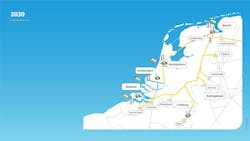Gasunie set to oversee North Sea hydrogen network plan
Offshore staff
AMSTERDAM — The Dutch government said it would appoint gas grid operator Gasunie to oversee plans to develop a hydrogen network in the North Sea, Energy Minister Rob Jetten said Dec. 2 in a letter to parliament, according to a recent Reuters report.
The Dutch government is due on Dec. 8 to hold a parliamentary debate on ambitious plans to convert much of the Netherlands' natural gas network to hydrogen over the coming decade.
The country has plans to add more than 1 GW of offshore wind capacity annually for many years, reaching 20 GW by 2030.
Engineers say not all of that can be used during morning and afternoon hours when most is generated, and the government is exploring alternative ways to store electricity, the Reuters report stated. Batteries and hydrogen are among solutions under consideration.
"After 2030, a significant share of energy from wind parks will be transformed into hydrogen and brought to shore with pipelines, because over these long distances transport of hydrogen is more efficient than transporting electricity," Jetten said in the letter.
The Dec. 2 letter envisions Gasunie as the organization to oversee the construction of hydrogen pipes to carry hydrogen to shore, along with 4 GW of capacity to convert electricity at sea to hydrogen through hydrolysis. No cost estimate for the projects was given.
Jetten said the country was on track to realize 500 MW of hydrolysis capacity by 2025.
"The cabinet expects to subsidize 800 MW to 1,000 MW of hydrolysis projects in the IPCEI [Important Project of Common European Interest] in the coming year," Jetten said.
He cited figures of 783.5 million euros as being available for a second round of hydrogen projects and another 794 million euros for third and fourth rounds, including for hydrogen import projects.
"The division of these resources among concrete projects will be made known in 2023," he said.
Back in October, Gasunie stated in a news release that the electrolysis projects so far are all being carried out on land and that the technology of producing hydrogen at sea is in its infancy.
"I think the first larger pilots and projects could be operational in 2028 or 2029," said Werna Udding, who is responsible for offshore hydrogen at Gasunie. "Preparations for that need to start right now. That means we also need to get started soon with the development of the offshore hydrogen network so that it is ready in time to bring the hydrogen produced at sea ashore."
12.05.2022



